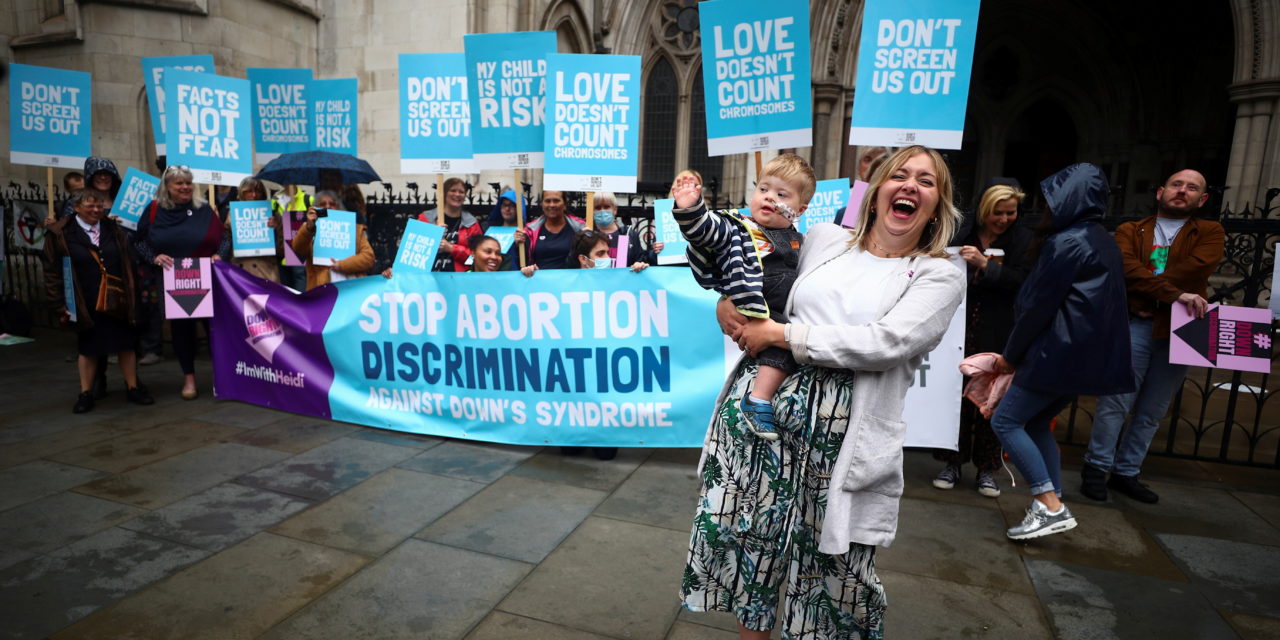Newlywed Heidi Carter is on a mission to save preborn children from abortion for simply having the same condition that she has, Down syndrome. It’s a practice that the 24-year-old woman considers “deeply offensive.”
“It’s downright discrimination, that’s what it is,” Carter said, who previously worked in a child’s hair salon before the pandemic. “I will not tolerate it. That someone like me or James, my husband, could be aborted just before birth is just not on.”
In another interview, she explained, “And the reason why it’s important to me and James is because we are someone who has Down syndrome. And we want to say to the world that we have a good quality of life.”
In the United Kingdom, it is legal to abort a child with Down syndrome at any point during the pregnancy. For most other pregnancies, abortion is just legal until the 24th week. According to the latest reports, about 90% of children with the condition are aborted in the country.
Now, she and others are fighting in the courts to protect preborn babies from discriminatory abortions.
According to The Times of London, “The case is being brought against Sajid Javid, the new health secretary, seeking a change in the Abortion Act of 1967 to prevent terminations after 24 weeks for all non-fatal disabilities, including Down’s. The campaigners also want to stop third-trimester abortions being available on the National Health Service (NHS). The case is backed by the charity Don’t Screen Us Out and the actress Sally Phillips, whose son, Olly, 15, has Down’s syndrome.”
In 2016, Phillips helped produce “A World Without Down’s Syndrome” for the BBC, where she advocated for people with the condition, like her son Olly, and their right to life.
“I was expecting tragedy, but I got comedy,” Phillips explains to the audience while horsing around with her three sons, including the rambunctious Olly.
She continued later in the documentary, “My big question at the beginning of this is, ‘What’s so dreadful to the world about Down syndrome?’”
It’s a legitimate question, especially based on the story provided by Maire Lea-Wilson who was offered abortion at 36 weeks after her doctors concluded that her child likely had the condition.
Lea-Wilson explained: “I was told there is a 50:50 chance the baby has Down’s, and asked: ‘What do you want to do?’ The options included termination. I remember asking: ‘Is this even legal?’ They said yes and also advised me that it is what most people choose to do.
“I was completely shocked and so was my husband. When I said I wanted to carry on with the pregnancy, that decision was written into my hospital notes, yet I was asked several times more over the next few days whether I wanted to continue. The last time I was asked whether I wanted to terminate the pregnancy was at 36 weeks by an obstetrician, just a few days before Aidan was born.
“It is tragic especially when I think about Aidan, who is the funniest little boy ever. He just cracks me up. I was absolutely petrified of having a baby with Down’s but terminating was not something I could have done at that [late] stage. To be honest, I am glad I did not find out earlier because I might have missed out on my fabulous little boy.”
Another mother shared her own harrowing story of being offered abortion at least 15 times. Emma Mellor said, “At 38 weeks, the doctors made it really, really, really clear that if I changed my mind on the morning of the induction to let them know, because it wasn’t too late.
“I was told that until my baby had started travelling down the birth canal, I could still terminate.”
One of the leading experts for their case is Katrina Scior, an NHS psychologist and professor of clinical psychology and stigma studies at University College London.
She said, “I have worked with people whose parents were in the past told they could not look after their Down’s syndrome baby and they had to have them committed to an institution for the next 30 years of their lives. People with Down’s syndrome now lead their own lives in their own flats with support, many are married and hold jobs.”
The stigma against Down syndrome is still strong in the U.K. and around the world. Seeing young people like Heidi fighting for their right to live is encouraging and shows giving birth to a child with Down syndrome is not an “immoral” choice, as atheist Richard Dawkins once claimed, but one that in fact recognizes the sanctity of every human life.
Recently, Sally Phillips took Dawkins to task, posting an Instagram picture of her son Olly grinning ear to ear with the cheeky caption, “Dinner out at #Maddalenas #southfreo. Suffering terribly as you can see, Professor Dawkins.”
Pray that this measure is successful and that children with Down syndrome in the U.K. and around the world are protected from abortion simply for having an extra chromosome.
Picture from Reuters.






